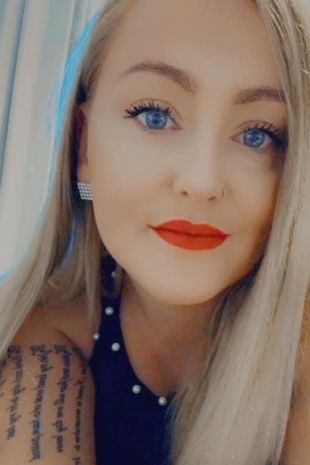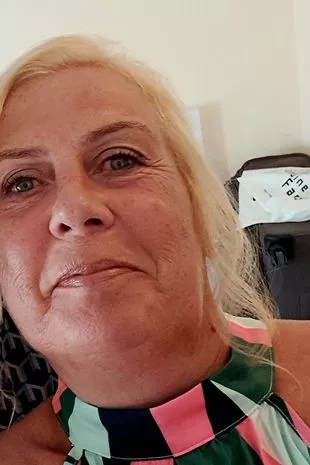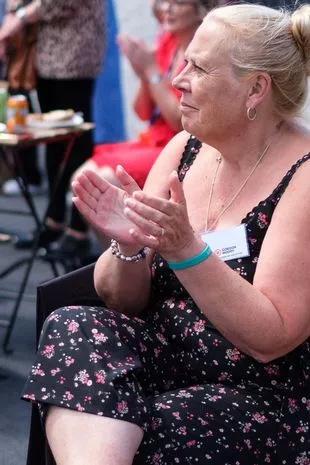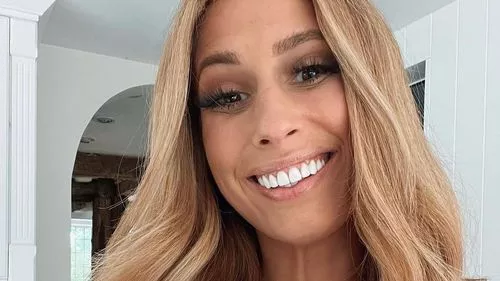As a gambling charity reports a an 84% surge in women desperate to stop gambling, two women tell the Mirror their stories about how their ‘silent addiction’ to betting almost ruined their lives.
Carly’s Story
Single mum Carly McGuinness, 33, from Stoke-on-Trent, has been in recovery for a year after attending Gordon Moody’s five-week residential course for gambling addiction. She says gambling almost took everything – the only way she could see to escape her addiction was taking her own life.
Carly said: “I started going to bingo with family and friends from the age of about 12, but back then it was sociable and fun. I never once thought the buzz of a win would make me want to orphan my children and take my own life.
“I suffered from anxiety and depression, then fell pregnant at 15, so online bingo became my escape away from everything else, my way to forget. The moment my baby was asleep I’d grab my phone and gamble, which I guess is so common with busy mums desperate for some down time. I had another baby a year later, and on antidepressants and stuck at home with two small babies to care for alone, gambling soon became my life.

“It wasn’t until my mid-20s that it became a problem – I didn’t have the money to keep playing bingo or online slots, so I would lie to my mum to borrow money for something at home, some food or whatever else I made up. The moment I started lying to those who loved me, it was a turning point, making me into something horrible, not me. Then it became a dark secret, me chasing my losses, borrowing more and more money, which I knew I’d never pay back.
“Living in a council flat alone with my kids, I’d gamble up to 15 hours a day, going to bed with my phone and regularly waking up in the night to check on my bets. I was exhausted, and felt like the worst person and mum in the world, my depression and anxiety fed by my secret addiction. I knew I needed help, and even went to two Gamblers’ Anonymous meetings, but they were full of mostly older men and I just felt like it wasn’t for me – and didn’t go back.
“When I was 29 the unimaginable happened – I won £150,000 on an online slots game, money I knew would, or should, change everything. I could buy my council house, I could give me and the kids a new future. I told my mum, dad and sisters what I’d won, and promised I’d spend it wisely, but the addict in me wouldn’t stop and within a year I’d re-gambled it all, and more on top. Again, I didn’t tell anyone, the feelings of guilt and shame crushing me.
“The turning point was the start of last year when, through friends, I met a man called Lee, and we soon became a couple. Last September he sat me down and said he’d noticed my gambling, and asked if I needed help. I opened up to him about the whole truth – my addiction, my depression, the lot – and he said he’d do everything to help. I even told Lee how I’d borrowed money off him to gamble, how I’d been suicidal and considered taking my life and leaving my kids without a mum. We had a cry together, and he helped me look online for help, where we found Gordon Moody.
“I filled in the online application and a day or so later I got a call saying they could offer me a place at their five-week residential rehab program in Birmingham. Lee said he’d look after my kids and I agreed to do the course. That was the best day of my life, the start of my recovery, me getting my life back.
“I met the rest of my cohort in group Zoom chats, and then we all met in person at the site in Birmingham. The four of us became like family, like sisters, and from day one I was open and honest for the first time in what felt like forever. We all put the gambling blocking software GamBan on our phones straight away, and every day had individual sessions with therapists, group sessions, craft-making sessions, and even trips out shopping, to the zoo, or long walks.
“The first few days were very hard, but by week two I really felt like I’d turned a corner. The other women and I all felt we could be ourselves again, not mum, or a cleaner, or a cook, but us. I spent a lot of my downtime making and drawing things, presents for the course leaders or bits for my family. I basically had time to refocus, and soon the other women in my cohort – and the course leaders – became closer than I could’ve ever imagined.
“Walking back into my home felt so strange – this was the place where for so long I’d spent every waking moment with my phone in my hand, gambling, and now I’d changed beyond my wildest imagination. Before I’d gone I’d told my kids where I was going, and they were amazing, saying how they just wanted me to get better – so when I walked back in the door, they gave me massive hugs, which was heart-melting. I felt proud of who I was, what I’d done, I was finally the mum they deserved.
“I was so proud of myself I posted on Facebook about where I’d been those past five weeks, how close I’d been to taking my own life because of gambling, how any woman trapped in gambling addiction who read this should know there’s hope. That post got hundreds of likes, and I was swamped with personal messages saying how inspirational I was. I’d spent years hiding this horrible secret from my closest friends and family, now I was sharing it with the world. The sense of freedom and relief, it’s hard to put into words how good I felt. One of the strangers who read that message ended up contacting Gordon Moody for help, which is incredible.
“I’m now still regularly in touch with the other women from my cohort, all of whom are still in recovery like me, not gambling. The bond we have is unbreakable, and I’m sure we’ll be friends forever. We’ve got a spa day together planned in the New Year, which I can’t wait for, and I’m sure there’ll be countless other get-togethers in the coming years.
“I’m also still regularly in touch with the course leaders and counsellors from Gordon Moody, and have even started a course to become a peer-mentor for recovering gamblers. My only regret is I didn’t do all of this sooner.”
Jayne’s Story
In September last year, Jayne Smith, 57, from Basildon, Essex, felt so ashamed of what she’d become through her gambling addiction that she walked out her front door, determined never to come home. The mum of four – and grandmother of 11 – could see no option to end her addiction other than killing herself.
She said: “From as long as I can remember, gambling’s always been a part of my life, a bit of harmless fun. Even as a child we used to go down to the local bingo hall as a family, we visited the arcade at the seaside with my grandparents in Bournemouth, or at Clacton or Canvey Island. My parents would give me some change to put in the slot machines, and I’d like the flashing lights, the thrill of a win.
“We also went to the bingo as a family, and I clearly remember winning £300 when I was 18, at a time when I was only earning £30 a week. That thrill was like a drug, a high I’ll never forget.
“It was only about eight years ago that gambling became a problem for me, and I first realised just how destructive gambling can be, how it can ruin lives, whole communities. With our four kids all grown up I had a fair bit of spare time in the evenings and with loads of gambling apps on phones, I guess it was only a matter of time. I’d scroll through social media on my phone and see adverts for online slots, and thought ‘Why not? I’d loved it as a girl, and didn’t want to go to an arcade.
“Without knowing it, it became a complete obsession, a nightly fix, then something I wanted to do more and more. At first my husband, John, knew what I was up to – I had to as he could see me spending money, and I enjoyed sharing the news of my wins. But I started to hide it when the losses outnumbered those wins and I ran out of money, but didn’t want to stop. Chasing my losses, I remembered that £300 win when I was 18, the buzz, and lost control.


“Soon I couldn’t afford the rent, I couldn’t pay John back hundreds of pounds I’d borrowed, and we started having massive rows. I promised I’d stop gambling, and when I started again, he said he’d leave me – and I didn’t blame him. I knew I was losing my family, but I had no choice but to gamble.
“I banned myself from several major sites, then started on foreign ones, I used my kids to create accounts for me to gamble with, I even bribed them to help me with the techie aspects of withdrawing winnings under false names. I was begging, borrowing, stealing to keep my habit going, obsessed that the next big win was around the corner. I’d turned into a monster, a liar, someone I hated more than anyone else could ever understand.
“I didn’t know any other women who were problem gamblers, and certainly didn’t know where to turn for help, so last September I walked out of my house determined to end everyone’s misery and kill myself. I went to visit my best friend’s grave to talk to her, then went to my mum’s house, which I knew would be empty, where I could end it all. But when I was there the police knocked on the door and asked if I was ok – my daughter had noticed I hadn’t been home for hours, sensed I wasn’t mentally well and knew where I’d go, so called 999.
“Back at home I told my daughter the truth, and she got on her phone and straight away found Gordon Moody – we did the assessment together and just hours later got a call from one of the charity’s support workers asking more details.
“Straight away I felt like I’d found the answer, someone who knew who I was, that this addiction was an illness I needed help with. I got offered a place on their five-week residential rehab course, which I jumped at – if I didn’t do this, I simply didn’t know how I’d continue, which is madness considering I had a loving husband, four amazing children and 11 grandchildren who loved me.
“To say that course was life-changing is the biggest understatement imaginable. The other women on the course with me were so open about their addiction, and I felt like I wasn’t alone for the first time in years. They just got me, they understood, and it just took one nod from me when they opened up for them to feel the same. Addiction doesn’t care what job you do, what colour your skin is, what sex you are, it’s an illness which can be terminal if it’s not treated.
“I learned so much about myself, knowing I’m not just a mum, a sister, a wife, I’m not my addiction. Slowly I rebuilt feelings of self-worth and gained the tools to move forwards. I also learned that there’s no magic wand, and found other focuses to be happy, specifically painting and making greetings cards. Before then I never thought I’d like or be any good at art, but when I walked out of those doors five weeks later, I had a passion for life. I had a reason for living other than gambling.
“I’m still great friends with those women – including Carly – and know I can call Gordon Moody any time of day or night for support if I need it. I’m 12 months on now, and feel like I’ve been set free from a prison. I’m expecting two more grandchildren in 2024, twins I’d never have cuddled if I’d taken my life last September.
“There’s so much shame and stigma around women gambling, that this doesn’t happen to us, when actually nothing could be further from the truth. It’s a silent addiction that almost took my life, turned me into something despicable and dishonest, but I’m living proof that with support, you can recover and find your way back.”
If you’re struggling and need to talk, the Samaritans operate a free helpline open 24/7 on 116 123. Alternatively, you can email [email protected] or visit their site to find your local branch.
